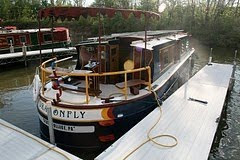 |
| Wind turbine in paradise: Just steps from our boat to this ecofriendly Margaritaville |
Another Saturday night, and SlowBoat was docked literally steps from the actual Margaritaville: Lulu's. This funky restaurant is owned and operated by Jimmy Buffet's sister, Lucy. We're told that 10 years ago this place was a dive; these days it's an engineered tropical paradise, serving cheeseburgers to as many as 4,000 guests a day in summer.
I wandered around Sunday morning, checking out the palm trees, the candy-colored lawn chairs, the thatched-roof tiki bar, the pretend-beach with its gleaming white sand . . . and the wind turbine. Huh?
Lucy Buffet clearly knows that "going green" is good for business. She's chosen lawn chairs made from recycled plastic, cheeseburger patties hand-fashioned from locally grown, grass-fed Alabama beef, and local tomatoes to top those cheeseburgers. In the restrooms ("Guys" and "Gals") Dyson "airblade" hand dryers come with signs explaining just how little power they use. Her target demographic (baby-boomers like me who know all the words to "Margaritaville") approves of these touches.
The wind turbine, according to a report in the local paper, was installed in 2008, after the restaurant's general manager visited an upstate NY ski resort completely powered by sustainable energy. The Lulu turbine "provides 25 to 40 percent of the power needed for the outdoor bar, called Bama Breeze." (Cute, huh? "Alabama breezes power the 'Bama Breeze.")
Of course, this is a facility that serves 750,000 meals a year. So, churning out enough clean, renewable electricity to run the margarita blenders at one (out of multiple) bars is a small start towards sustainability. But it's a start.
 |
| The showy guy is a male hooded merganser in full breeding plumage. |
Cold temperatures and high winds made it seem more like Upstate New York than coastal Alabama. The lone pleasure boat we saw during the course of the day was piloted by a guy in one of those funky Russian winter caps--an enormous helmeted affair made of luxuriant gray fur, with the ear flaps firmly down.
Later, we found a peaceful anchorage in Ingraham Bayou. Unbroken lines of slash pines along the shore, pied-billed grebes and loons in their subdued gray winter plumage peacefully foraging around our boat . . . and more cavorting dolphins.
But there was a counterpoint to this natural idyll. The Cap'n raised the hatch and dropped down in the engine room to clean out the water intake filter, a chore he does once a week.
 |
| So pretty . . . and so evil! |
Heck, I remember the first zebra mussel sightings, back in the 1980s. Biologists think big cargo boats, coming from Europe, carried these little clam-like guys here, in their juvenile, planktonic form, suspended in ballast tank water.
The boats flushed their tanks in the Great Lakes and--same story as with Asian carp. The mussels liked it just fine in their new home. They reproduce fast. And they eat microsopic plankton--piles of it.
The mussels themselves are like water filters--high efficiency filters. Water in the Great Lakes has become crystal clear, which seems like a good thing, superficially.
But there's only so much plankton to go around, and mussels strip the water of food that native species need. Meanwhile, by making the water SO clear, they create ideal conditions for pesky water weeds to grow.
Not to mention, mussels clog water intake pipes at hydropower and water treatment plants. They cling tight and they're hard to remove. And in what one teenage girl on the Trent Severn told me was the greatest tragedy of all, those razor sharp shells can cut your feet up seriously when you go for a swim. Girls now have to wear clunky water shoes with their bikinis.
The path of our boating trip so far has tracked the history of the spread of zebra mussels from the Great Lakes southward down the Mississippi. We saw them clinging to the sides of locks on the Ohio River, encrusting rocks on the shores of Kentucky Lake, and again in locks on the Tennessee River.
Ten years ago, zebra mussels had not yet invaded the Tenn Tom Waterway. Now--as we see!-- they've travelled that system and established themselves in Mobile Bay.
And like the Blob (only with sharp edges) they're not done spreading. Last year, for the first time ever, zebra mussels were found in Texas. This summer their presence was confirmed in North Dakota. And later this week, citizens in Omaha, Nebraska, will meet to learn about what they can do about the invaders.
There's just one tiny bright spot on the horizon--a spot of brightly polished irony. Biologists say, if those pesky Asian carp DO make it into the Great Lakes, they may not be much of a problem after all. The zebra mussels may not leave them enough to eat.
P.S. Let me know: Anything else you'd like to see (or know about) on the SlowBoat blog?





No comments:
Post a Comment